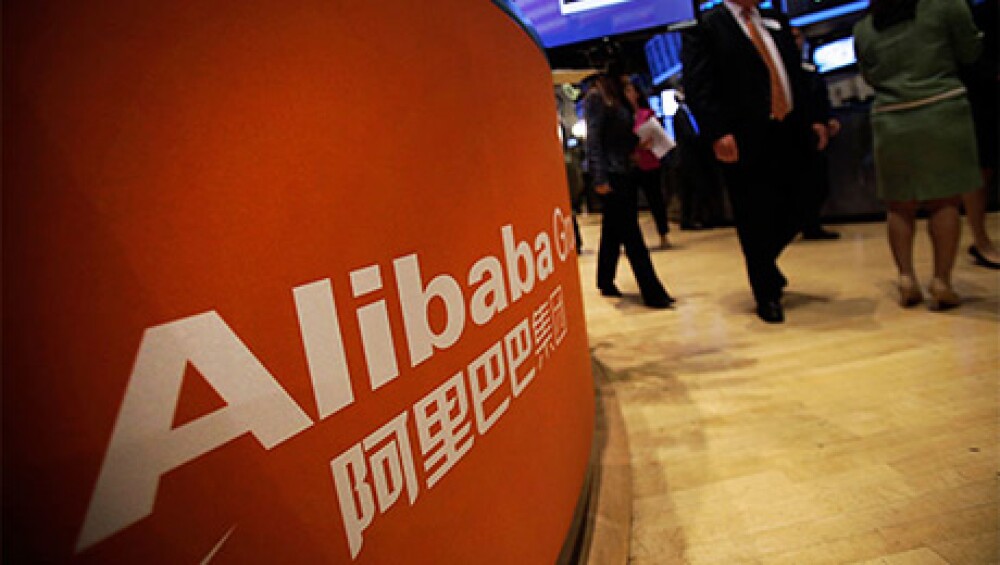When Jack Ma appeared on the floor of the New York Stock Exchange on September 19 for the initial public offering of Alibaba Group Holding, it was slightly disappointing to see him decked out in sensible pants, a navy shirt and a simple black jacket. Ma has built a reputation as an eccentric showman since founding sprawling Chinese e-commerce empire Alibaba in 1999. He’s showed up at company functions in costume as a punk rocker; last year he threw a party for 40,000 Alibaba employees to celebrate stepping down as CEO (he retained the title of chairman) and used it as an occasion to belt out the pop hit “I Love You, China”; in June he bought a 50 percent stake in Guangzhou Evergrande Football Club, declaring at the same time, “I know nothing about soccer.”
But on September 19 there was no need for theatrics from the 50-year-old Ma. The size of the deal spoke for itself: The most anticipated IPO in recent history was also, once bankers exercised the so-called green shoe and released an additional 48 million shares for trading on Alibaba’s first day as a U.S.-listed company, the biggest-ever public offering. At $25 billion, Alibaba’s share sale smashed the previous world record of $22.1 billion that Agricultural Bank of China had raised with its 2010 IPO in Hong Kong and Shanghai. In the wake of the smaller U.S. listings of Qunar and 58.com in late 2013 and JD.com last May, Alibaba’s IPO capped a comeback for China-based businesses pursuing cross-border listings, just three years after NYSE delisted more than 100 Chinese companies for fraud and accounting malpractice. Those with global ambitions, especially in the consumer Internet sector, now have an established, well-trodden path to the U.S. public market.
The battle to list Hangzhou-based Alibaba raged fiercely through late 2013 and into 2014, with three venues — the Hong Kong Stock Exchange, the Nasdaq Stock Market and NYSE — duking it out. Hong Kong balked over shareholder protection issues, refusing to allow Alibaba to maintain its idiosyncratic corporate governance structure, in which 28 partners, despite controlling just 10 percent of shares, get to appoint a majority of the board of directors; residual concerns about the botched 2012 Facebook offering tarnished Nasdaq’s pitch.
That left NYSE. The ultimate success of the Alibaba deal was the result of the exchange’s unique auction process, which relies on electronic and human-driven price-setting to minimize the likelihood of technology mishaps, and an extraordinary level of coordination among the banks underwriting the offering.
In a departure from Wall Street custom, the six firms — Citigroup, Credit Suisse, Deutsche Bank, Goldman Sachs Group, JPMorgan Chase & Co. and Morgan Stanley — functioned as a band of equals, with no dealer assigned the lead role of allocating shares. The IPO also set a record for underwriting fees, if only in nominal terms, with Alibaba paying its bankers $300 million; Morgan Stanley and Credit Suisse each reaped more than $50 million. (As a percentage of the overall offering, however, these fees were well below Wall Street’s customary ratio.)
The exercise of the green shoe on the first day of trading was a testament to the sheer demand for the company, vindicating banker attempts to ensure that allocations at the IPO went to investors interested not in a quick flip but in Alibaba’s long-term growth story. The following months have seen a steady uptick in the stock price, from $92.70 at opening to more than $110 by November 6. With a market capitalization topping $271 billion, Alibaba is already bigger than General Electric Co., Procter & Gamble Co., Chevron Corp. and Facebook.
Ma’s attempts to lay out Alibaba’s expansion strategy since the IPO have been typically gnomic and elusive. He’s mixed declarations of an intention to grow in the U.S. with moves to partner with nominal local rivals Amazon.com and eBay. But the swagger is still there — no surprise given that Ma’s net worth now exceeds $24 billion. “I would say that my model is good; Amazon would say that their model is good,” he said at November’s World Internet Conference in Wuzhen, China. “We’ll see who will still be here 20 years from now.”
Top 10 Deals of 2014
- Kinder Morgan Goes All In
- Comcast Faces Screen Test
- Actavis Realizes Bigger Pharma Ambitions
- Medtronic, Covidien Home In on Tie Up
- Lafarge and Holcim Pour It On
- Alibaba Sets IPO Record with NYSE Debut
- Facebook’s Data-Driven Takeover of WhatsApp
- Altice Turns Paper Profit
- Eurobank Ergasias Spearheads a Greek Banking Revival
- Bond Issue Boosts U.K.'s Renminbi Trading Cred







